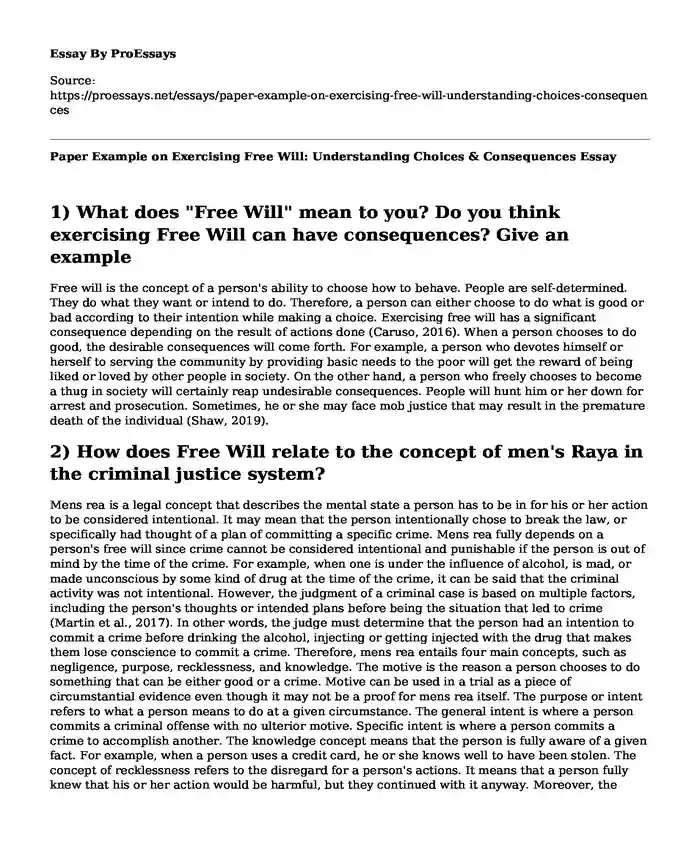1) What does "Free Will" mean to you? Do you think exercising Free Will can have consequences? Give an example
Free will is the concept of a person's ability to choose how to behave. People are self-determined. They do what they want or intend to do. Therefore, a person can either choose to do what is good or bad according to their intention while making a choice. Exercising free will has a significant consequence depending on the result of actions done (Caruso, 2016). When a person chooses to do good, the desirable consequences will come forth. For example, a person who devotes himself or herself to serving the community by providing basic needs to the poor will get the reward of being liked or loved by other people in society. On the other hand, a person who freely chooses to become a thug in society will certainly reap undesirable consequences. People will hunt him or her down for arrest and prosecution. Sometimes, he or she may face mob justice that may result in the premature death of the individual (Shaw, 2019).
2) How does Free Will relate to the concept of men's Raya in the criminal justice system?
Mens rea is a legal concept that describes the mental state a person has to be in for his or her action to be considered intentional. It may mean that the person intentionally chose to break the law, or specifically had thought of a plan of committing a specific crime. Mens rea fully depends on a person's free will since crime cannot be considered intentional and punishable if the person is out of mind by the time of the crime. For example, when one is under the influence of alcohol, is mad, or made unconscious by some kind of drug at the time of the crime, it can be said that the criminal activity was not intentional. However, the judgment of a criminal case is based on multiple factors, including the person's thoughts or intended plans before being the situation that led to crime (Martin et al., 2017). In other words, the judge must determine that the person had an intention to commit a crime before drinking the alcohol, injecting or getting injected with the drug that makes them lose conscience to commit a crime. Therefore, mens rea entails four main concepts, such as negligence, purpose, recklessness, and knowledge. The motive is the reason a person chooses to do something that can be either good or a crime. Motive can be used in a trial as a piece of circumstantial evidence even though it may not be a proof for mens rea itself. The purpose or intent refers to what a person means to do at a given circumstance. The general intent is where a person commits a criminal offense with no ulterior motive. Specific intent is where a person commits a crime to accomplish another. The knowledge concept means that the person is fully aware of a given fact. For example, when a person uses a credit card, he or she knows well to have been stolen. The concept of recklessness refers to the disregard for a person's actions. It means that a person fully knew that his or her action would be harmful, but they continued with it anyway. Moreover, the concept of negligence refers to the failure of taking proper care over something. All these four concepts are based on the free will of an individual (Caruso, 2016).
3) How do your choice and free Will impact other discretion?
A person's choice and free will influence other discretions. For example, the intention in the heart of a person determines their behavior in a given situation. A person can choose to give another person false information with the intention to blackmail them. In addition to that, a person can leak confidential information of another person with an intention to defame them for a particular cause, such as politics. Therefore, choice and free will have a significant impact on other discretions (Shaw, 2019).
References
Caruso, G. D. (2016). Free will skepticism and criminal behavior: A public health-quarantine model. Southwest Philosophy Review, 32(1), 25-48. https://www.sciencedirect.com/science/article/abs/pii/S1053810016303488
Martin, N. D., Rigoni, D., & Vohs, K. D. (2017). Free will beliefs predict attitudes toward unethical behavior and criminal punishment. Proceedings of the National Academy of Sciences, 114(28), 7325-7330. https://www.pnas.org/content/114/28/7325?mod=article_inline
Shaw, E. (2019). The implications of free will skepticism for establishing criminal liability. Free Will Skepticism in Law and Society, 192.
Cite this page
Paper Example on Exercising Free Will: Understanding Choices & Consequences. (2023, Aug 29). Retrieved from https://proessays.net/essays/paper-example-on-exercising-free-will-understanding-choices-consequences
If you are the original author of this essay and no longer wish to have it published on the ProEssays website, please click below to request its removal:
- Critique of Linda Hasselstrom's "a Peaceful Woman Explains Why She Carries a Gun"
- Reflection: The Crime of Incest
- Research Paper on Family and Criminal Law
- Essay Example on Smart Borders: Quantum Security Solutions for Situational Awareness
- Essay Sample on Ethnic Identity: Creating Conflicts or a Sense of Belonging?
- Essay Example on The Self: Avocado & Artichoke Philosophies
- Essay Example on Law Enforcement: Fighting Crime with Lethal & Nonlethal Weapons







